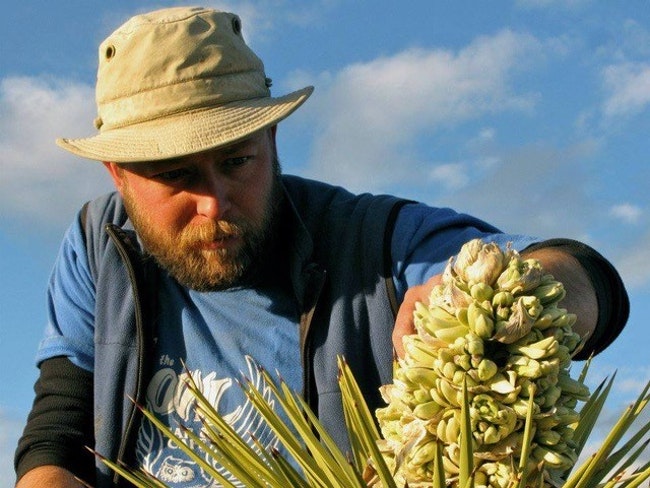
Christopher Irwin Smith studying a Joshua tree at his primary field site in Tikaboo Valley, Nevada, just outside of Area 51. (Courtesy/Christopher Irwin Smith)
In a career of researching natural science, Christopher Irwin Smith’s fondest memory is the summer he spent studying bats in Oregon.
Then fresh out of college, he and a group of researchers would wake up around 3 p.m., make coffee and drive into the woods where they worked all night. They used a nose hair trimmer to shave a bald spot on the bats, attached radio transmitters to their backs and tracked where they were foraging in the McKenzie River Valley.
“It was so much fun,” Smith said.
After 13 years as a biology professor at Willamette University, he recently received the 2021 Lynwood W. Swanson Scientific Research Award at the 30th annual Murdock College Science Research Conference.
Named after Lynwood Swanson, a 30-year trustee at the M.J. Murdock Trust and former academic dean and professor at Linfield College, the award honors faculty at private institutions with 10 years of experience and a nationally recognized research program. The Murdock Trust supports communities in five states including Oregon through grantmaking and other programs.
“I’m very excited to join the ranks of other faculty in the Pacific Northwest who are very accomplished,” Smith said, “and it’s very nice to be recognized by my colleagues for the work I’ve been doing.”
Smith’s passion for natural science started when he was growing up in Arizona. “A lot of my childhood was just running around in the desert and looking at weird plants,” he said. By his senior year at the University of Arizona, he knew he wanted to dedicate his life to scientific research and teaching.
For Smith, 47, his research started as a graduate student. He earned his undergraduate degree from UA in 1996 and spent a summer working for Oregon State University and studying bats. He then studied at the Argonne National Laboratory in Chicago before starting graduate school at Harvard University, where he earned his PhD.
Smith was a postdoctoral scholar at the University of Idaho for five years until he joined Willamette in 2008.
While looking for a job, he said he wanted to join a university that reflected his values. He remembered a common sentiment among graduate students and faculty when he was in college that teaching was a waste of time. At some large schools, he said, “there is this real disdain for teaching that I found really offensive.”
Since he started at Willamette, Smith said he has made it a priority to engage his students with interactive lectures, an effort he has finetuned over the years. “A lot of the time students are working on solving problems and talking together or working together as a class on figuring something out, and less of the time am I standing up there and jabbering at them,” he said. “Just listening to somebody explain something to you, most of the time, it just goes in one ear and out the other, and if you actually work on a problem and discover the information for yourself, you’re much more likely to retain it.”
 Christopher Irwin Smith at his primary field site in Tikaboo Valley, Nevada, in 2009. (Courtesy/Christopher Irwin Smith)
Christopher Irwin Smith at his primary field site in Tikaboo Valley, Nevada, in 2009. (Courtesy/Christopher Irwin Smith)
Smith studies coevolution, or how interactions between organisms causes their evolutionary change. “The big thing that I’m interested in is insect and plant diversity,” he said.
Much of Smith’s research for the past decade has focused on Joshua trees, which are only pollinated by moths. He has a field site based just outside of Area 51 in Nevada, where his and his undergraduate students’ research found the two Joshua tree species in the area crossbreed because the moths “make mistakes.”
“Both the moths and the plants suffer consequences for making mistakes. The moths leave their babies when they go to the wrong tree, and the trees make fewer fruit when they have the wrong moth,” he said. “So, what we think we see at that site is that there’s natural selection which is keeping species separate.”
Moses Lee, senior director for scientific research and enrichment programs at the Murdock Trust, said Smith came onto his radar when the organization received nominations for him, which are required to include a recommendation letters from the candidate’s institution and two from people who aren’t friends or mentors of the candidate.
Lee said the caliber of Smith’s research made him stand out as a candidate, particularly his work studying the relationship between moths and Joshua trees.
“He is well recognized for his work in field ecology, but in particular, in his study area,” Lee said. “He loves the nature and he loves the uniqueness of nature – weirdness, he calls it – of nature.”
Smith said the Murdock Trust has supported him throughout his career and made it possible for him to get started at Willamette. They’ve provided him with several grants over the years, including one that allowed him to buy equipment to set up his lab when he first started.
“The Murdock has been incredibly generous, and I owe enormous debt and gratitude to them,” he said.
Contact reporter Ardeshir Tabrizian: [email protected] or 503-929-3053.
JUST THE FACTS, FOR SALEM – We report on your community with care and depth, fairness and accuracy. Get local news that matters to you. Subscribe to Salem Reporter starting at $5 a month. Click I want to subscribe!









